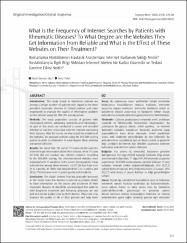| dc.contributor.author | Gürcan Atçı, Aysel | |
| dc.contributor.author | Tolu, Sena | |
| dc.date.accessioned | 2020-10-27T07:59:45Z | |
| dc.date.available | 2020-10-27T07:59:45Z | |
| dc.date.issued | 2020 | en_US |
| dc.identifier.citation | Gürcan Atçı, A. ve Tolu, S. (2020). What is the frequency of internet searches by patients with rheumatic diseases? To what degree are the websites they get information from reliable and what is the effect of these websites on their treatment? İstanbul Medical Journal, 21(4), 275-280. https://dx.doi.org/10.4274/imj.galenos.2020.38243 | en_US |
| dc.identifier.issn | 2619-9793 | |
| dc.identifier.issn | 2148-094X | |
| dc.identifier.uri | https://dx.doi.org/10.4274/imj.galenos.2020.38243 | |
| dc.identifier.uri | https://hdl.handle.net/20.500.12511/5980 | |
| dc.description.abstract | Introduction: This study aimed to determine internet use among a certain number of patients with regard to the three prevalent rheumatic diseases in clinical practice and more importantly to evaluate the quality of information available on the internet using the DISCERN scoring system.Methods: The study population consists of patients with rheumatoid arthritis, ankylosing spondylitis and fibromyalgia. As part of this study, we conducted a survey and recorded whether or not they researched over the internet concerning their diseases. After the survey, we also tested the reliability of the websites. We analysed websites using the DISCERN scoring system in order to determine to what degree these websites contained sufficient.Results: We found that 102 out of 173 cases (58.9%) used the internet to get information about their disease, while 71 cases (41.04%) did not conduct any internet research. According to the DISCERN scoring, the aforementioned websites were evaluated with 15 questions in the survey. Consequently, it was inferred that among these websites, 24 (27.2%) had high-level (4 to 5 points), 44 (50%) had medium-level (2 to 3 points) and 20 (22.7%) had poor-level (1 point) quality and reliability.Conclusion: The digital interest that has gradually increased in the recent years has become a concern as patients desire to have information on the course and treatment of their rheumatic diseases. It should be acknowledged that patients with long-term treatment and follow-up processes are not and will not be guided only by their doctors. Physicians may improve the quality of life of their patients and help them avoid unnecessary anxieties, if they regard the foregoing when they inform and instruct them. | en_US |
| dc.description.abstract | Amaç: Bu çalışmanın amacı poliklinikte takipli romatoloji hastalarının hastalıklarının tedavisi hakkında internette araştırma yapma oranlarını, internetin hastaların tedavi ve takiplerine etkisini araştırmak ve hastaların rehber olarak kullandıkları internet sitelerinin güvenilirliklerini belirlemektir. Yöntemler: Çalışma popülasyonu romatoid artrit, ankilozan spondilit ve fibromiyaljili hastalardan oluşmaktadır. Bu çalışmanın bir parçası olarak, anket yapılmış ve internet üzerinden hastalara hastalıkları hakkında araştırma yapıp yapmadıklarını kayıt altına alınmıştır. Anket yapıldıktan sonra, web sitelerinin güvenilirliğini de test edilmiştir. Bu web sitelerinin hastalıklarla ilgili ne derece yeterli ve güvenilir bilgi içerdiğini belirlemek için DISCERN puanlama sistemini kullanarak web sitelerini analiz edilmiştir. Bulgular: Yüz yetmiş üç romatoloji hastasının geneline baktığımızda 102 olgu (%58,9) hastalığı hakkında bilgi almak için interneti kullanırken, 71 olgu (%41,04) internette araştırma yapmamıştı. DISCERN skorlamasında, ankette bulunan 15 soru eşliğinde internet siteleri değerlendirildiğinde 24’ü (%27,2) yüksek düzey (4-5 puan), 44’ü (%50) orta düzey (2-3 puan), 20’si (%22,7) kötü düzey (1 puan) kaliteye ve bilgi güvenilirliğine sahipti. Sonuç: Dijital ilgi, romatizmal hastalıkların seyri ve tedavisini irdelemek isteyen hastalar tarafından da kullanılmaktadır. Uzun soluklu tedavi ve takip süreci olan bu hastaların yönlendirilmesinde, günümüzde ve gelecekte sadece doktor kontrolü altında olamadığının bilinmesi ve mevcut websitelerinin gerek sağlık bakanlığı gerekse ilgili dernekler tarafından sıkı denetim altında tutulması ile hastaların yanlış bilgilendirilmesi ve yönlendirilmesinin önüne geçilebilir. | en_US |
| dc.language.iso | eng | en_US |
| dc.publisher | Istanbul Training and Research Hospital | en_US |
| dc.rights | info:eu-repo/semantics/openAccess | en_US |
| dc.subject | DISCERN | en_US |
| dc.subject | Information Reliability | en_US |
| dc.subject | Internet | en_US |
| dc.subject | Fibromyalgia | en_US |
| dc.subject | Rheumatoid Arthritis | en_US |
| dc.subject | Ankylosing Spondylitis | en_US |
| dc.subject | DISCERN | en_US |
| dc.subject | Bilgi Güvenirliliği | en_US |
| dc.subject | İnternet | en_US |
| dc.subject | Fibromyalji | en_US |
| dc.subject | Romatoid Artrit | en_US |
| dc.subject | Ankilozan Spondilit | en_US |
| dc.title | What is the frequency of internet searches by patients with rheumatic diseases? To what degree are the websites they get information from reliable and what is the effect of these websites on their treatment? | en_US |
| dc.title.alternative | Romatizma hastalarının hastalık araştırması internet kullanım sıklığı nedir? Hastalıklarıyla ilgili bilgi aldıkları internet siteleri ne kadar güvenilir ve tedavi üzerine etkisi nedir? | en_US |
| dc.type | article | en_US |
| dc.relation.ispartof | İstanbul Medical Journal | en_US |
| dc.department | İstanbul Medipol Üniversitesi, Tıp Fakültesi, Dahili Tıp Bilimleri Bölümü, Fizik Tedavi ve Rehabilitasyon Ana Bilim Dalı | en_US |
| dc.authorid | 0000-0002-1111-3110 | en_US |
| dc.identifier.volume | 21 | en_US |
| dc.identifier.issue | 4 | en_US |
| dc.identifier.startpage | 275 | en_US |
| dc.identifier.endpage | 280 | en_US |
| dc.relation.publicationcategory | Makale - Uluslararası Hakemli Dergi - Kurum Öğretim Elemanı | en_US |
| dc.identifier.doi | 10.4274/imj.galenos.2020.38243 | en_US |


















